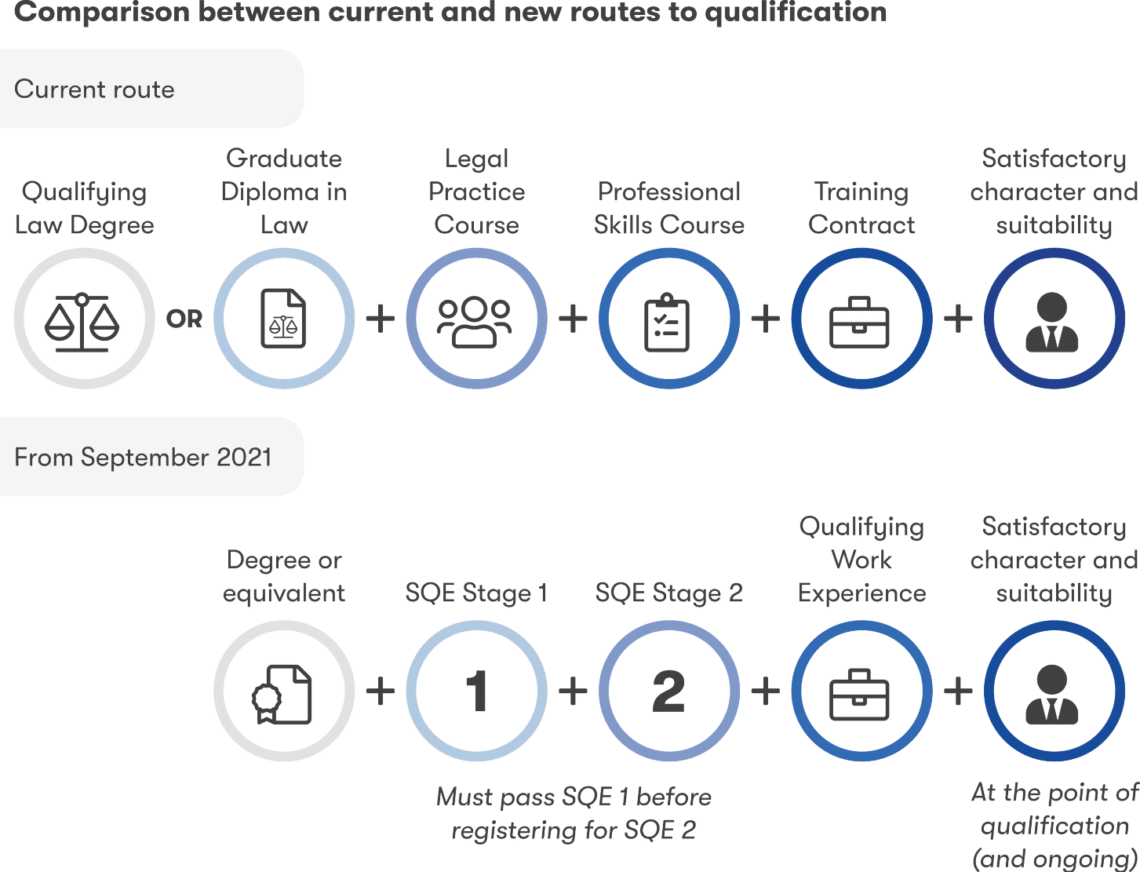The start of the 2021/22 academic year will see the introduction of the new Solicitors Qualifying Examination (SQE), the new catch-all route to becoming a solicitor in England and Wales.
This means that, unless you’ve already started studying a law degree or completed part of the qualifying route that’s already in place, there will be an all-new format to get to grips with – in this article, we’ll cover everything you need to know about the SQE and how you can best prepare for it.
How is the SQE structured?
Under the current system, non-law graduates looking to qualify as solicitors are required to first take the Graduate Diploma in Law (GDL), before going on to take the Legal Practice Course (LPC) along with those who have a qualifying law degree. Both are courses that lead up to a series of exams covering different topics in law and practical skills, and along with the period of recognised training make up the steps required to qualify.
The new route will have a more streamlined structure, although you should bear in mind that the SQE proper only consists of the examination sessions as set out by the Solicitors Regulation Authority (SRA) – you can take a practice course with any of the approved providers.
The SQE is broken down into two main exam sessions – SQE1 and SQE2. In the first set of exams, you’ll be tested on the theory needed to practise as a solicitor, collectively known as Functioning Legal Knowledge (FLK). This includes subjects such as Business Law and Practice, Dispute Resolution, Contract Law, and Property Practice. Overall, the topics are divided into two main exams, assessed through a multiple-choice, written test.
SQE2, on the other hand, is more geared towards the practical skills you’ll be using as a solicitor, and is broken down into five days of exams – two consisting of oral assessments, and the other three of written tests. This section of the SQE will focus on skills related to legal research and writing, advocacy and client interviews, through which you’ll be assessed on technical knowledge areas such as criminal litigation, dispute resolution and property practice.
When can SQE be taken?
The SRA has planned for there to be four exam sessions over the course of the academic year – two each covering SQE1 and SQE2. For SQE1, the first sitting takes place in November, with another session coming in July.
Candidates will sit the SQE2 exams in April or October of 2022 – although you should bear in mind that this won’t necessarily be the timetable followed by SRA in the following years, as further exam sessions are added according to demand.
You’ll have three chances to pass the exams, as well as a six-year window in which to undertake SQE2 once you’ve done the first set of exams. Overall, one sitting of both SQE1 and SQE2 will cost approximately £4,000 – this excludes the price of any preparation courses you might undertake.
How does the SQE change the pathway to qualifying?
Beyond the qualifications overhaul, the SQE has also brought changes to the work experience you’ll need to complete before qualifying as a solicitor. While graduates were previously required to complete a training contract, the new specifications have broadened the scope of the recognised training you can undertake, as long as this amounts to two years’ worth of placements.
This will be known as Qualifying Work Experience, and covers a range of positions such as working as a paralegal or voluntary work within a legal remit – as long as the placement covers the SRA’s ‘core competencies’, it can be signed off as QWE and go towards your 24 months of work experience. Training contracts will still be a valid route towards qualifying, but given the limited number of law firms offering these placements, the new requirements allow for more flexibility.
How can I prepare for the SQE?
In the lead-up to taking the exams, you can either enrol on an SQE preparation course with some of the established providers, or study in your own time. The first option would see you undertake a course – full or part-time – over the course of the academic year, much like the GDL and LPC courses already in place.
Alternatively, the material covered under SQE1 is readily available in textbooks and manuals, covering each different subject. If you’ve already studied a qualifying law degree you’ll find that many of the modules you’ve already covered will mirror those FLK topics in the exam, so looking over your past lecture notes and course material can be a good way of preparing for SQE1 as well.
The introduction of SQE signals a complete overhaul in the way graduates qualify as a solicitor, with the distinction between law and non-law graduates effectively removed. Nevertheless, you can rest assured that the contents of the new exams will remain focused on the same key areas of law and practical skills that all prospective solicitors have been studying until now.


